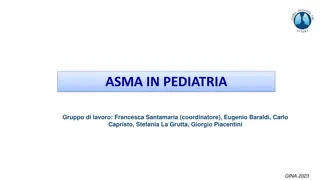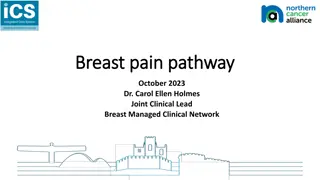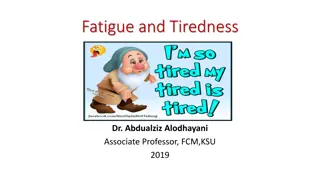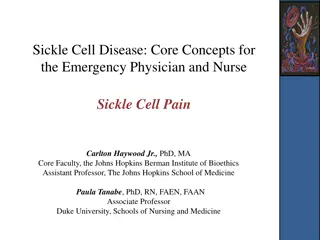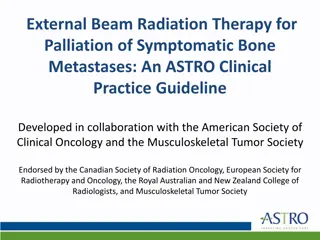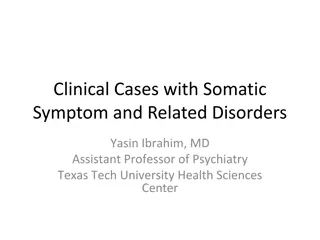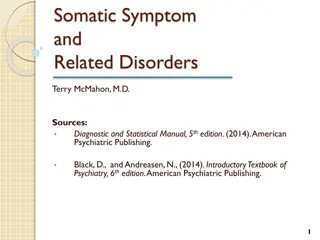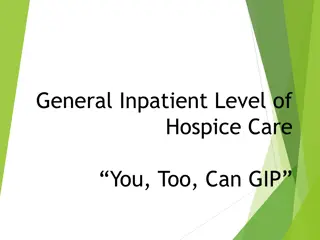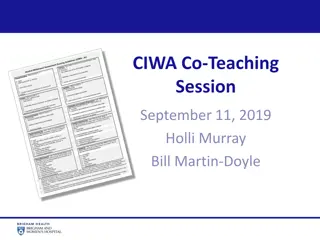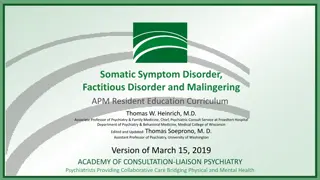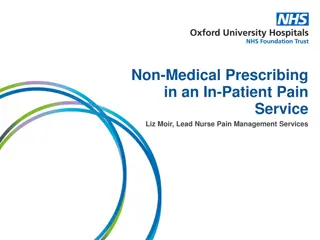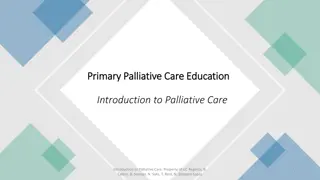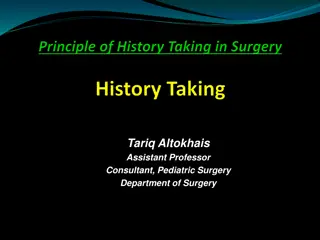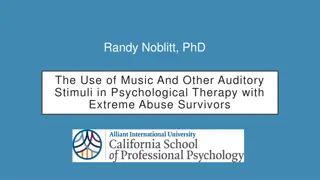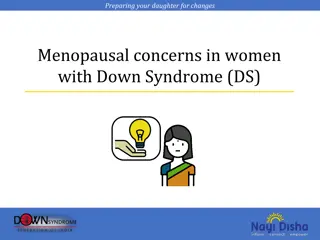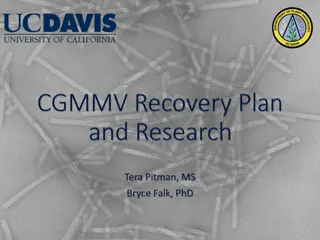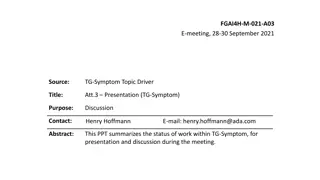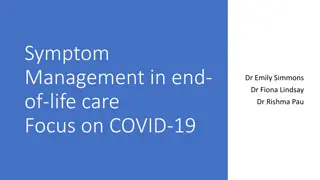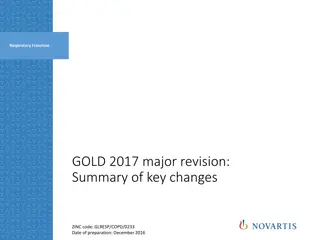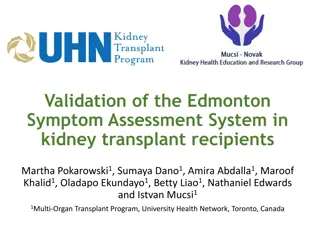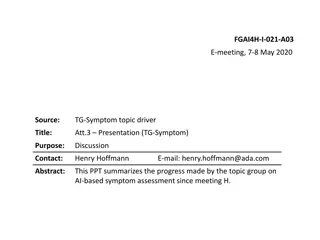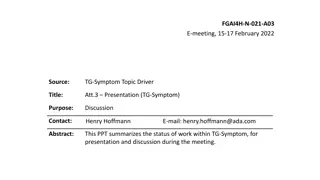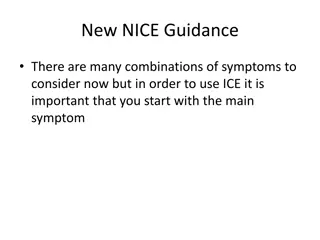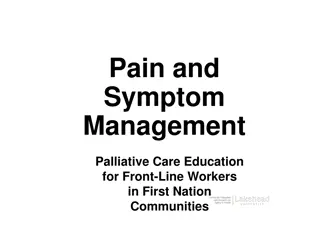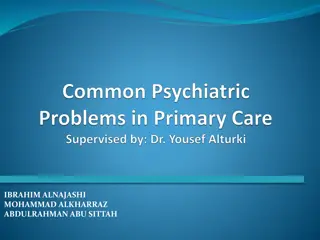SMALL FIBRE
Small fiber neuropathy involves thin and unmyelinated nerve fibers, leading to various sensory disturbances. The Erlanger and Gasser classification details the different types of nerve fibers involved. Symptoms include burning, tingling, and numbness, often presenting in a stocking-glove pattern. Di
4 views • 53 slides
ASMA IN PEDIATRIA
Pediatric asthma guidelines for children aged 5 years and above, outlining diagnosis criteria, symptom patterns, and treatment recommendations based on GINA 2023. The content covers characteristics suggestive of asthma, including recurrent non-productive cough, wheezing, and shortness of breath, and
3 views • 30 slides
PKB - Patients Know Best
PKB (Patients Know Best) is a patient-held record platform that empowers patients to access and manage their health information effectively. It enables patients to track symptoms, connect devices, share data with clinical teams, and engage in self-care. With features like communication tools, sympto
0 views • 10 slides
Understanding Breast Pain and the Breast Pain Pathway
Breast pain, characterized by tenderness, throbbing, sharp, or burning sensations in the breast tissue, can affect individuals of all genders. This common symptom may vary in severity and frequency, and is typically not associated with cancer. The Breast Pain Pathway outlines the management of breas
2 views • 13 slides
Understanding Fatigue: Definitions, Causes, and Management
Fatigue is defined as an unpleasant symptom that affects an individual's normal functioning capacity. It can manifest as tiredness, weakness, or lack of energy. Common causes of fatigue include sleep loss, heavy physical or mental work, and chronic conditions like Chronic Fatigue Syndrome. The manag
3 views • 36 slides
Understanding Sickle Cell Disease Pain Management
Sickle cell disease (SCD) patients often experience vaso-occlusive crises (VOC) causing acute pain, a hallmark symptom of the disease. Pain management is crucial in healthcare interactions for these patients, with chronic pain also being a significant concern due to organ/tissue damage. Research sho
1 views • 18 slides
Cardiologist In Jaipur-Dr Rahul Sharma
Angina Symptoms: Angina is a condition characterized by chest pain or discomfort caused by reduced blood flow to the heart muscle. It\u2019s often a symptom of underlying coronary artery disease, which occurs when the arteries that supply blood to the heart become narrowed or blocked by plaque build
1 views • 6 slides
ASTRO Clinical Guideline on Palliative Radiation Therapy for Symptomatic Bone Metastases
This ASTRO clinical guideline focuses on the use of external beam radiation therapy for palliation of symptomatic bone metastases, emphasizing its efficacy in pain management and local symptom control. Updated evidence and recommendations address the evolving landscape of metastatic cancer treatment
0 views • 32 slides
Complex Case Study: Chronic Pain and Somatic Symptom Disorder
Michelle Adams, a 51-year-old hairdresser, presents with severe chronic back pain following a traumatic incident. Despite various treatments and medications, her pain persists, leading to distress and functional impairment. Her symptoms align with Somatic Symptom Disorder (SSD) with predominant pain
0 views • 50 slides
Understanding Somatic Symptom Disorders, Conversion Disorders, and Dissociative Disorders
Somatic symptom disorders manifest as physical symptoms without apparent cause, while conversion disorders involve specific physical symptoms incompatible with medical conditions. Illness anxiety disorder involves interpreting normal sensations as disease symptoms. Dissociative disorders lead to a s
1 views • 41 slides
Understanding Somatic Symptom and Related Disorders
Exploring the key features, diagnostic criteria, contributing factors, and management principles of Somatic Symptom and Related Disorders. This comprehensive guide covers the clinical manifestations, co-morbidities, and treatment approaches associated with these disorders, shedding light on somatic
2 views • 38 slides
Alcohol Withdrawal Management: CIWA Co-Teaching Session Highlights
Explore key aspects of managing alcohol withdrawal through the CIWA scale in a co-teaching session. Learning objectives include recognizing withdrawal symptoms, determining appropriate protocol application, and utilizing the CIWA scale for symptom-triggered management. Dive into case scenarios and v
0 views • 22 slides
Understanding Hospice General Inpatient Care (GIP)
Hospice General Inpatient Care (GIP) is a level of care in hospice settings intended for short-term management of acute symptoms that cannot be addressed in other settings. Initiated when other efforts for symptom management have not been successful, GIP provides skilled nursing care around the cloc
1 views • 47 slides
Comprehensive Overview of CIWA-Ar Scale for Alcohol Withdrawal Management
This article provides detailed information on the Clinical Institutes Withdrawal Assessment Scale for Alcohol (CIWA-Ar), focusing on its utilization in managing alcohol withdrawal symptoms. It covers learning objectives, signs and symptoms of alcohol withdrawal, complications, timelines, and the ben
0 views • 18 slides
Understanding Somatic Symptom Disorder and Related Disorders
This educational material delves into Somatic Symptom Disorder, Factitious Disorder, and Malingering, emphasizing the importance of accurate diagnosis and management. It explores various aspects, including symptoms, classifications, and implications in bridging physical and mental health. The conten
0 views • 91 slides
Understanding the Brain: Key Insights on Chronic Pain and EMDR Therapy
Persistent pain is often a symptom originating from the brain, not the body tissues. EMDR therapy can help reprocess maladaptive memory networks linked to chronic pain, addressing root causes including adverse childhood experiences. The AIP model emphasizes early-life factors in shaping chronic pain
0 views • 28 slides
Best Practices for Racial Equity Rapid Response Outreach
This document outlines suggested practices for a racial equity rapid response outreach program, focusing on a workflow for patient outreach, prioritizing patients based on specific criteria, and components of screening including wellness checks and screening for chronic medical conditions. The workf
0 views • 6 slides
Practical Aspects of Non-Medical Prescribing in In-Patient Pain Management
Exploring the challenges and strategies involved in non-medical prescribing within in-patient pain services, focusing on practicalities, education, COVID-19 symptom management, and improving prescribing practices. The content delves into the complexities of the in-patient pain service, the role of n
0 views • 11 slides
Comprehensive Primary Palliative Care Education Curriculum
This comprehensive primary palliative care education curriculum, designed by UC Regents, provides a nine-hour interactive program to equip clinicians with core knowledge, skills, and attitudes for caring for seriously ill patients and families. The curriculum covers topics such as psychological and
0 views • 20 slides
End-of-Life Symptom Management for COVID-19 Patients: A Comprehensive Guide
This comprehensive guide focuses on symptom management in end-of-life care for COVID-19 patients, covering identification of signs of dying, communication with residents and families, recognition of end-of-life symptoms, and pharmacological/non-pharmacological approaches. It also provides valuable r
0 views • 19 slides
Effective Patient History Taking in Surgery
Key tips for effective patient history taking in surgery include preparing yourself to be a good physician, emphasizing the importance of appearance, treating patients with empathy, and understanding the components of patient history. It is essential to introduce yourself, delve into the chief compl
0 views • 29 slides
The Use of Music and Auditory Stimuli in Psychological Therapy with Extreme Abuse Survivors
Extreme abuse survivors often find solace and emotional regulation through music and other auditory stimuli, which can evoke various responses such as containment, identity switching, and flashbacks. Despite being less discussed in clinical literature, these stimuli play a crucial role in therapy wi
0 views • 27 slides
Human Disease Symptom Network: Understanding Disease Relationships Through Symptoms and Genes
The Human Disease Symptom Network (HSDN) is constructed using a large-scale medical bibliographic records database to form a network of human diseases based on symptom similarities. By integrating disease-gene associations and protein-protein interaction data, correlations between symptom similarity
0 views • 37 slides
Understanding Menopausal Concerns in Women with Down Syndrome
Women with Down Syndrome may experience menopause earlier than the general population, around the age of 46 on average. It's important for parents to prepare their daughters with DS for the physical and emotional changes that come with menopause. Communication, awareness, and support play key roles
0 views • 14 slides
Understanding Diarrhea: Causes, Symptoms, and Pathophysiology
Diarrhea is a common symptom that can be caused by various factors such as viral, bacterial, parasitic infections, dietary changes, drugs, systemic diseases, and intestinal obstructions. It can lead to dehydration and other serious complications if not treated promptly. The pathophysiology of diarrh
0 views • 15 slides
Understanding Cucumber Green Mottle Mosaic Virus: Disease Cycle and Testing Methods
This content provides detailed information on Cucumber Green Mottle Mosaic Virus, including its nucleotide genome, disease cycle, testing methods like DAS-ELISA and RT-PCR, seed testing protocols, bioassay for virus confirmation, and symptom expression in host plants. The data covers aspects such as
0 views • 14 slides
Progress Report on AI-Based Symptom Assessment in Healthcare
This report provides an overview of the advancements in AI-based symptom assessment for healthcare applications. It covers the discussion points from the recent e-meeting, presentation updates, and the current status of benchmarking systems and ontology work within the Topic Group Symptom. The focus
1 views • 11 slides
Management of Malignant Ascites in Advanced Cancer: ESDO Learning
Malignant ascites is a challenging complication of advanced cancer, impacting patient quality of life and survival. Diagnosis involves imaging and cytology, with poor prognostic indicators. Management includes symptom relief with diuretics, paracentesis, and catheter options. Refractory cases presen
0 views • 7 slides
Understanding and Managing Chronic Conditions
Chronic conditions affect millions of people, requiring long-term management and lifestyle changes. Patients must adapt physically, socially, and emotionally, facing different phases throughout their lives. Prevention is crucial, but once a chronic disease occurs, focus shifts to symptom management,
0 views • 50 slides
Boise Bible College Fall 2020 Covid-19 Guidelines
Boise Bible College's Fall 2020 Covid-19 guidelines prioritize face coverings, physical distancing, hand hygiene, and symptom monitoring. These guidelines emphasize flexibility and grace while aiming for the safety and well-being of the college community. Measures such as mandatory face coverings, s
0 views • 9 slides
Asthma, GERD & Dyspepsia: Diagnosis and Management Scenarios
In this medical scenario-based content, we explore cases of bronchial asthma in an 8-year-old boy with symptoms frequency assessment, risk factors, and management strategies. Moving on to dyspepsia and GERD, we delve into diagnostic approaches for a 54-year-old male with H. pylori and a 57-year-old
0 views • 9 slides
Symptom Management in End-of-Life Care: Focus on COVID-19
Review signs of dying, communicate effectively with residents and families, identify end-of-life symptoms (especially related to COVID-19), and explore non-pharmacological and pharmacological approaches for symptom management. Resources and guidance are provided for caring for individuals in the com
0 views • 19 slides
GOLD 2017 Major Revisions in COPD Management
GOLD 2017 introduces significant changes in Chronic Obstructive Pulmonary Disease (COPD) management, focusing on areas like defining COPD, assessment tools, pharmacological management, inhaler techniques, and comorbidity management. The updated definition emphasizes persistent respiratory symptoms.
0 views • 17 slides
Validation of the Edmonton Symptom Assessment System in Kidney Transplant Recipients
Patient-reported outcomes play a crucial role in understanding the symptom burden and quality of life in chronic kidney disease patients, including kidney transplant recipients (KTRs). This study assesses the validity and reliability of the Edmonton Symptom Assessment System in KTRs, focusing on phy
0 views • 21 slides
Update on AI-Based Symptom Assessment Progress
This presentation summarizes the progress made by the topic group on AI-based symptom assessment since the E-meeting held on 7-8 May 2020. It covers the AI task related to symptom assessment, the journey and approach of the group so far, and the current status of the topic group members and contribu
0 views • 9 slides
AI-Based Symptom Assessment Applications in Healthcare
The presentation highlights the status of work within TG-Symptom for discussion during the e-meeting. It covers AI-based symptom assessment mobile/web applications, pre-clinical triage, and differential diagnosis. The meeting provides updates on symptom assessment and benchmarking approaches within
0 views • 13 slides
Updated Guidance on Colonic Imaging Tests for Various Symptoms
The new NICE guidance outlines recommended tests based on different symptom complexes, emphasizing the importance of starting with the main symptom, such as rectal bleeding or abdominal mass. Specific tests like flexible sigmoidoscopy, colonoscopy, or CT scans are suggested depending on age and fitn
0 views • 5 slides
Comprehensive Guide to Pain and Symptom Management in Palliative Care Education
Explore a comprehensive guide on pain and symptom management in palliative care education, emphasizing the importance of effective care plans and team participation. Learn about different types of pain, perception variations, and total pain factors affecting end-of-life care in First Nation communit
0 views • 28 slides
Cancer Symptom Trials Telehealth Challenges Workshop
Cancer Symptom Trials Telehealth Challenges Workshop held on 8th December 2020 addressed various clinical challenges in telehealth, including how they impact clinicians and patients. The workshop focused on cancer symptoms, evidence, gaps in research, and a proposal for future studies.
0 views • 5 slides
Understanding Anxiety, Depression, and Somatic Symptom Disorder in Saudi Arabia
This content discusses the prevalence, etiology, clinical features, and management of anxiety, depression, and somatic symptom disorder in Saudi Arabia. It also covers the importance of counseling and psychotherapy in family medicine settings and knowing when to consult a psychiatrist. The content i
0 views • 50 slides

